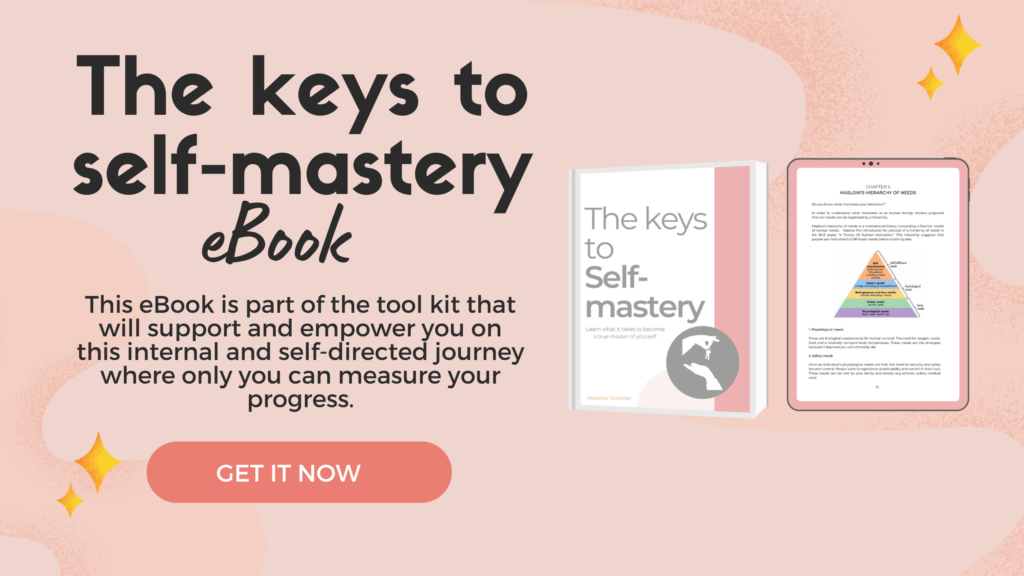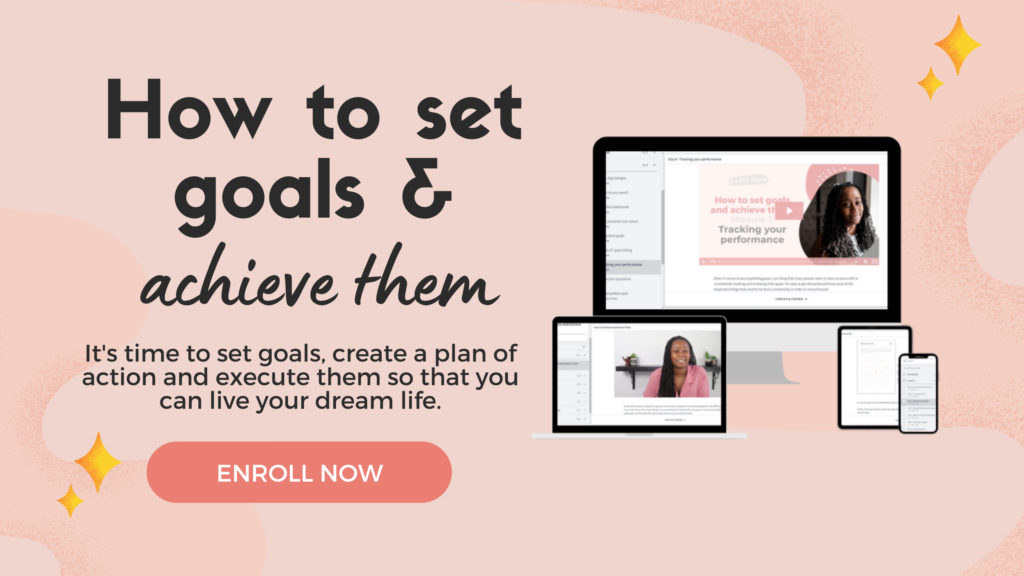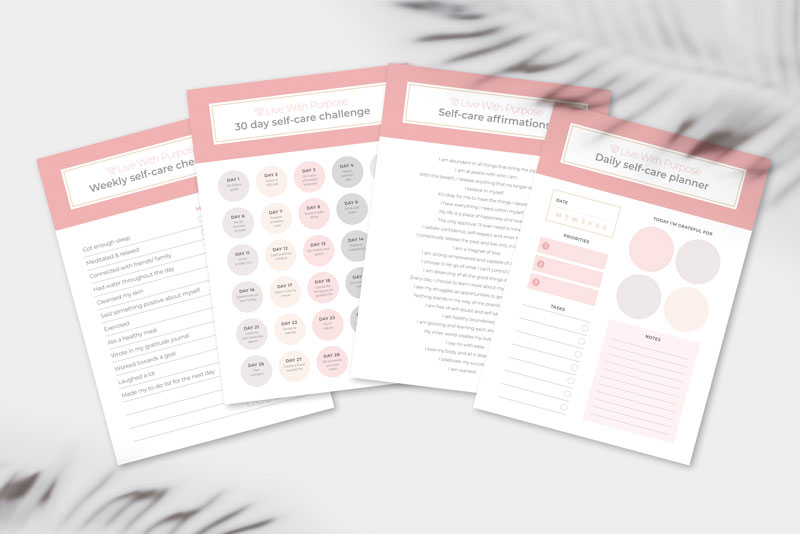
In a world that often emphasises the value of social connections, there’s an important distinction to be made between being alone and feeling lonely.
Many people associate solitude with a sense of isolation or sadness, but the truth is that being alone can be a fulfilling and rejuvenating experience. 😊
In this blog post, I will explore the nuances of being alone versus feeling lonely, understanding the importance of solitude, and embracing the positive aspects of both states.
Let’s get to it. 💕
The Difference Between Being Alone and Feeling Lonely:
Being Alone:
Being alone is a state of physical solitude, where you find yourself without the company of others. It can occur by choice or as a natural consequence of circumstances. Spending time alone provides an opportunity for self-reflection, relaxation, and personal growth.
It allows you to engage in activities that bring you joy, pursue hobbies, or simply enjoy a moment of peace. Being alone can be a deliberate choice, a time to recharge and connect with oneself. 🥰
Feeling Lonely:
Loneliness, on the other hand, is an emotional state that arises from a perceived lack of meaningful connections. It’s possible to feel lonely even in a crowded room if the connections are superficial or unfulfilling.
Loneliness is often characterised by a sense of emptiness, isolation, or a longing for deeper human connections. It’s a complex emotional experience that can impact mental and physical well-being. 😟

Embracing the Positive Aspects of Being Alone:
1. Self-Discovery:
Being alone provides an opportunity for self-discovery. It allows you to explore your thoughts, feelings, and interests without external influences. Use this time to reflect on your goals, values, and aspirations. Self-discovery is a crucial aspect of personal growth and can lead to a deeper understanding of oneself.
2. Independence:
Embracing solitude fosters independence. When you’re comfortable being alone, you become more self-reliant and less reliant on others for your happiness. This independence can empower you to make decisions based on your own needs and preferences, leading to a more authentic and fulfilling life. 🥰
3. Creativity:
Solitude often sparks creativity. When you’re alone with your thoughts, you have the mental space to generate new ideas, think critically, and engage in creative pursuits (yaay). Many artists, writers, and innovators find inspiration in moments of solitude, leading to the creation of meaningful and impactful work. 🎨
4. Rest and Rejuvenation:
Being alone allows for rest and rejuvenation. In a world filled with constant stimuli, taking time for solitude can be a form of self-care. It provides an opportunity to relax, recharge, and focus on activities that bring you peace and joy, contributing to overall well-being.

Addressing the Challenges of Feeling Lonely:
1. Cultivating Meaningful Connections:
If loneliness arises from a lack of meaningful connections, focus on cultivating relationships that nourish your soul. Seek out individuals who share your values and interests. Join clubs, organisations, or communities where you can meet like-minded people. Focus on getting yourself out there. Quality connections are often more fulfilling than a large social circle. 🫂
2. Volunteering and Giving Back:
Engaging in volunteer work or contributing to your community can alleviate feelings of loneliness. By helping others, you not only make a positive impact on the world but also connect with individuals who share a common purpose. Volunteering provides a sense of belonging and fulfillment.
3. Seeking Professional Support:
If loneliness becomes a persistent and overwhelming emotion, maybe consider seeking professional support. A therapist or counselor can provide guidance and a safe space to explore the root causes of loneliness. Addressing these issues with professional help can lead to a more fulfilling and connected life. 🫶
Finding Balance:
The key to a fulfilling life lies in finding a balance between being alone and fostering meaningful connections. Embrace solitude as a time for self-discovery, creativity, and rejuvenation. At the same time, actively cultivate relationships that bring joy and fulfillment. Recognise that both states are essential for a well-rounded and satisfying life. 💕
Conclusion
Being alone and feeling lonely are two distinct experiences, each with its own set of opportunities and challenges. Embracing solitude allows for self-discovery, independence, creativity, and rest. However, if loneliness creeps in, it’s crucial to address it by cultivating meaningful connections, volunteering, or seeking professional support. You are not alone. ❤️
Understanding the nuances between being alone and feeling lonely empowers you to navigate both states with intention and purpose. Ultimately, finding a balance between solitude and social connections contributes to a rich and fulfilling life. Embrace the positive aspects of being alone, foster meaningful connections, and savor the journey of self-discovery in this beautiful dance between solitude and companionship.
Pin this post for a reminder 📌 👇

Related Blogs
Things to Say “No” to for you to Live a Happier Life
How to Stop Settling For Less Than You Deserve
How to Become the Best Version of Yourself: A Guide For 20-Somethings
In today’s fast-paced and ever-changing world, it’s more important than ever to invest in yourself.
With the constant demands placed upon us by work, family, and ourselves, it can be all too easy to neglect our own personal growth and development. 😑
However, the most successful and fulfilled individuals understand the importance of making self-investment a priority. In this blog, I’ll explore the top 10 ways you can invest in yourself to build a brighter future and unlock your full potential.
Let’s go! 🙌
Introduction to Investing in Yourself
Investing in yourself is about dedicating time, energy, and resources toward your personal growth and self-improvement. 😀
It’s about recognising your worth and understanding that the best investment you can make is in your own development. By prioritising self-investment, you’re not only enhancing your current skills and abilities but also preparing yourself for future opportunities and challenges.
In essence, investing in yourself is the key to unlocking a fulfilling and successful life. 💁♀️

Importance of Self-Investment for Personal Growth and Success
Self-investment is crucial for personal growth and success for several reasons.
First, it allows you to continually evolve and adapt to the changing world around you.
By actively seeking out new skills and knowledge, you’re able to stay ahead of the curve and remain competitive in your field. 🏆
Second, investing in yourself boosts your self-esteem and sense of self-worth. When you take the time to nurture your mind, body, and soul, you send a powerful message to yourself and the world that you are valuable, deserving, and capable of greatness. 💕
Finally, self-investment helps you to build resilience and navigate life’s inevitable setbacks with greater ease.
RELATED: You’re reading this blog because you’re big on personal growth and I love that for you! Are you ready to take it to the next level? Check out our Personal Growth Bundle!

The Power of Education and Lifelong Learning
One of the most effective ways to invest in yourself is through education and lifelong learning. By continually expanding your knowledge and skillset, you’re not only improving your current abilities but also preparing yourself for future opportunities and challenges. 🎯
P.s. Check out our range of courses here so you can do just the same.
This can be achieved in a variety of ways, such as taking classes, attending workshops, or enrolling in online courses. Additionally, don’t underestimate the power of self-directed learning through books, podcasts, and online resources. 📖
No matter how you choose to pursue education, the key is to remain curious and committed to your ongoing growth and development.
Building a Strong Professional Network
Another crucial aspect of self-investment is building a strong professional network.
Your network can provide invaluable support, guidance, and opportunities that can significantly impact your career trajectory. 📈
To build a robust network, make it a priority to attend industry events, conferences, and meetups.
Additionally, consider joining professional organisations or online forums related to your field. Finally, don’t forget the power of social media platforms such as LinkedIn, which can help you connect with like-minded individuals and stay informed about industry trends and job opportunities. 💼

Developing Essential Soft Skills
While technical skills are important, soft skills are equally crucial for personal and professional success. Soft skills, such as communication, leadership, problem-solving, and emotional intelligence, can help you navigate interpersonal relationships and stand out in the workplace. 🗣️
To develop these essential skills, consider participating in workshops, seminars, or online courses that focus on areas such as conflict resolution, negotiation, or effective communication. Don’t underestimate the power of practicing and honing these skills in your everyday life. 😌
Embracing a Healthy Lifestyle and Self-Care
Investing in your physical and mental well-being is a critical component of self-investment. By prioritising self-care and maintaining a healthy lifestyle, you’re not only improving your overall quality of life but also ensuring that you have the energy, focus, and resilience necessary to pursue your goals and aspirations.
This can include regular exercise, maintaining a nutritious diet, getting adequate sleep, and engaging in stress-reduction activities such as meditation, yoga, or mindfulness practices. 🥗
Remember, a healthy and balanced lifestyle is essential for long-term success and well-being.
P.S Check out our Health Bundle to find out more

Cultivating a Growth Mindset
A growth mindset is a belief that your abilities and intelligence can be developed through hard work, dedication, and perseverance.
By cultivating a growth mindset, you’re more likely to view challenges as opportunities for growth, embrace feedback, and maintain motivation in the face of setbacks. 😅
To develop this mindset, practice self-reflection and seek out opportunities to learn from your mistakes and failures. Additionally, surround yourself with positive influences and role models who embody the growth mindset and can provide support and encouragement.
Did anyone spring to mind when you read that? 🤔
Financial Investment in Personal Development
While many aspects of self-investment require time and effort, it’s also essential to consider the financial aspect of personal development. 👀
This can include investing in educational opportunities, professional certifications, or coaching and mentorship programs.
By allocating financial resources towards your growth and development, you’re not only reinforcing your commitment to self-improvement but also increasing your earning potential and career prospects. 💰
Remember, the return on investment from personal development can be invaluable in terms of personal fulfillment and financial success.
Are you ready to get your finances in order? Check out our finance bundle here 👇

Pursuing Hobbies and Passions
Investing in yourself also means dedicating time to your hobbies and passions. By engaging in activities you enjoy, you’re not only nurturing your creativity and expanding your skillset but also recharging your mind and promoting overall well-being.
Whether it’s painting, dancing, cooking, or writing, make it a priority to carve out time in your schedule to pursue your interests and cultivate joy in your life. 💕
Want to learn simple ways to love yourself? Check out this 10 simple ways to love yourself blog post!
Volunteering and Giving Back
Another powerful way to invest in yourself is by volunteering and giving back to your community. Not only does this provide a sense of purpose and fulfillment, but it can also help you develop new skills, forge meaningful connections, and gain valuable experiences.
Whether it’s through a local non-profit, a professional organisation, or an international volunteer program, seek out opportunities to make a positive impact and grow both personally and professionally. 💼
Conclusion: The Lifelong Benefits of Investing in Yourself
Investing in yourself is the key to unlocking a brighter future, filled with personal growth, success, and fulfillment.
By embracing education and lifelong learning, building a strong professional network, developing essential soft skills, maintaining a healthy lifestyle, cultivating a growth mindset, allocating financial resources towards personal development, pursuing hobbies and passions, and giving back through volunteering, you’re setting yourself up for a life of continuous growth and achievement. 🏆
Remember, you are your most valuable asset, and the investment you make in yourself today will pay dividends for years to come. ❤️
Pin this post for a reminder 📌 👇

Related Blogs
The Top 10 Reasons Why People Don’t Reach Success
In today’s fast-paced world, finding inner peace and serenity can be quite challenging. The constant demands on our time and attention can leave us feeling stressed, anxious, and overwhelmed.
That’s where meditation comes in. 🧘♀️
Meditation is a powerful tool that can help us slow down, quiet our minds, and cultivate a sense of inner calm and balance.
In this guide to meditation, we’ll explore the basics of meditation, its numerous benefits, and various techniques to help you find the practice that’s right for you. It will also provide a step-by-step process for beginners, tips for creating a comfortable meditation space, and resources to support your journey toward a more mindful and tranquil life.
Now let’s get started. 🙌
Understanding the benefits of meditation
Meditation has been practiced for thousands of years across various cultures and traditions. It has gained popularity in recent years due to its numerous physical, mental, and emotional benefits. Plus, who doesn’t love being flexible? 😂
Different types of meditation techniques
There is a wide variety of meditation techniques available to suit different preferences and needs. Some of the most popular methods include:
✨Mindfulness meditation: This practice involves focusing your attention on the present moment without judgment. It can be done by paying attention to your breath, bodily sensations, or a particular object.
Ps: Find out more about mindfulness meditation in The Keys to Self-Mastery eBook

✨Loving-kindness meditation (Metta): This technique involves cultivating feelings of love and compassion for yourself and others. It usually involves repeating phrases such as “May I be happy” and “May all beings be happy”. 😃
✨Body scan meditation: This type of meditation involves mentally scanning your body from head to toe, observing any sensations or tension that may be present.
✨Mantra meditation: This technique involves repeating a word or phrase, either silently or out loud, to help focus your mind and cultivate a sense of inner peace.
✨Visualisation meditation: In this practice, you focus on a mental image, such as a peaceful landscape or a person you admire, to help cultivate positive emotions and a sense of calm.
A beginner’s guide to meditation: Step-by-step process
Starting a meditation practice can seem daunting, but with a simple step-by-step process, you’ll be well on your way to embracing serenity. Here’s how to begin:
🕑Choose a time and place: Find a quiet space where you won’t be disturbed, and set aside a specific time each day for your meditation practice.
🪑Get comfortable: Whether you choose to sit on a cushion, chair, or floor, find a comfortable position that allows you to maintain an upright posture without straining.
😮💨Focus on your breath: Close your eyes, and begin by taking a few deep breaths. Then, let your breath return to its natural rhythm and simply observe each inhale and exhale.
👀Gently redirect your attention: As thoughts and distractions arise, gently acknowledge them and bring your focus back to your breath without judgment.
🧘♀️Be patient: Meditation is a skill that takes time and practice to develop. Be patient with yourself and remember that consistency is key.

Tips for creating a comfortable meditation space
Having a dedicated space for meditation can help support your practice and make it easier to establish a regular routine. Here are some tips for creating a comfortable and inviting meditation environment:
✨Choose a quiet spot: Find a space in your home where you can minimise distractions and noise.
✨Keep it simple: A clutter-free environment can help promote a sense of calm and focus. Keep your meditation space clean and organised.
✨Consider lighting and temperature: Natural light and a comfortable temperature can help create a soothing atmosphere for your meditation practice.
✨Create a ritual: Establishing a pre-meditation ritual, such as lighting a candle or playing soft music, can signal to your mind that it’s time to meditate and help you ease into the practice. Building a great meditation habit!
Overcoming common challenges faced by meditation beginners
As with any new skill, beginners often encounter challenges when starting a meditation practice. Here are some common obstacles and tips for overcoming them:
🥱Restlessness: It’s natural for your mind to wander when you first begin meditating. When this happens, gently bring your focus back to your breath without judgment or frustration. It’s totally normal!
🕒Lack of time: It can be difficult to carve out time for meditation in our busy lives. Start with just a few minutes each day and gradually increase the duration of your practice as you become more comfortable. Look at your current daily routine and see where you think you can slot some time in.
RELATED: Check out our How to set goals and achieve them mini-course!

🙃Impatience: Remember that meditation is a process, and it takes time and consistent practice to experience its full benefits. Be patient with yourself and celebrate your progress along the way.
Incorporating meditation into your daily routine
To experience the full benefits of meditation, it’s important to make it a regular part of your daily routine. Here are some tips for incorporating meditation into your life:
✨Establish a consistent schedule: Choose a specific time each day for your meditation practice and stick to it as consistently as possible.
✨Start small: Begin with just a few minutes of meditation each day and gradually increase the duration as you become more comfortable with the practice.
✨Find opportunities throughout the day: Look for opportunities to practice mindfulness and meditation throughout your day, such as during your morning commute or while waiting in line.
✨Set reminders: Use a calendar or smartphone app to set reminders for your meditation practice to help you stay consistent.
✨Join a meditation group: Participating in a meditation group or attending guided sessions can help you stay motivated and provide support as you deepen your practice.
Tracking your meditation progress
Monitoring your progress can be motivating and help you stay committed to your meditation practice.
Consider keeping a meditation journal to track your experiences, insights, and challenges. You can also use smartphone apps that offer guided meditations and track your sessions to help you stay consistent and monitor your progress over time. 😊

Exploring mindfulness and meditation resources
As you continue to develop your meditation practice, you may find it helpful to explore additional resources and tools to support your journey. Some options include:
📱Apps: Smartphone apps can offer guided meditation sessions, reminders, and tracking tools to help support your practice.
💻Online courses: Many organisations and meditation teachers offer online courses and workshops to help you deepen your understanding and practice.
🏖️Retreats: Attending a meditation retreat can be a transformative experience that allows you to fully immerse yourself in the practice and connect with like-minded individuals.
👭Local meditation groups: Joining a local meditation group can provide a supportive community and the opportunity to learn from experienced practitioners.
Conclusion: Embracing serenity through meditation
Meditation is a powerful tool for cultivating inner peace, reducing stress, and improving overall well-being.
By following this guide to meditation, you’ll be well on your way to embracing serenity and creating a more mindful, balanced life. Remember that patience, consistency, and self-compassion are key elements of successful meditation practice. 😄
As you continue to explore and deepen your practice, you’ll discover the profound benefits of meditation and the transformative impact it can have on your life. ❤️
Pin this post for a reminder 📌 👇

Related Blogs
The Ultimate Guide for Coping with Change
We all want to be happy, but too often we forget the most important person in our lives: ourselves. Loving yourself is a crucial step toward finding true happiness and contentment. ❤️
But what does it mean to love yourself? What are the benefits of loving yourself? And how can you start to build a better relationship with yourself?
In this blog, you’ll explore what it means to love yourself, the benefits of doing so, and how to build a better relationship with yourself.
By the end of this blog, you’ll have the tools and strategies to start loving yourself and living a life you love. 🥰
Because at the end of the day, isn’t that what we all want?
What Does it Mean to Love Yourself?
Loving yourself is about giving yourself the care, respect and compassion you deserve. It means taking care of your physical, emotional, and mental health. 🧠
It also means understanding your worth, embracing all of your flaws, and recognising that you have unique gifts to offer the world.
Loving yourself can be difficult, especially if you’ve been taught to put others before yourself or that you’re not worthy of love.
But it’s essential to your overall well-being and to reaching your goals. It’s also the foundation for forming healthy relationships with others and living a life of purpose and fulfillment. 💕

Benefits of Loving Yourself
The benefits of loving yourself can have a tremendous impact on your life. Here are some of the benefits of loving yourself:
💗Improved self-esteem: When you love yourself, you’ll start to see yourself in a more positive light. This can help you cultivate a healthier and more positive self-image.
💗Better relationships: Loving yourself can help you create healthier relationships with others. When you learn to accept and love yourself, you’ll be more likely to attract healthy, supportive relationships.
💗Greater resilience: Loving yourself gives you the strength to keep going even during difficult times. When you love yourself, you’ll be better equipped to handle challenges and setbacks.
💗More fulfillment: When you love yourself, you’ll be better able to pursue your passions and live a life of purpose and fulfillment.
Tips for Building a Better Relationship with Yourself
Loving yourself can be a challenge, but with the right tools, you can start to build a better relationship with yourself. Here are some lovely tips to help you get started:
✨ Challenge negative thoughts: The first step is to challenge your negative thoughts. When you notice yourself thinking negative thoughts, take a step back and challenge them. Ask yourself, “Is this thought true?” or “Is there another way of looking at this situation?” 🤔
✨ Practice self-compassion: Self-compassion is about being kind to yourself and treating yourself with the same understanding and care you would give to a friend. When you make a mistake or fail at something, practice self-compassion instead of self-criticism. You’re allowed to make mistakes.
✨ Celebrate your successes: Don’t forget to celebrate your successes, no matter how small. Recognise your accomplishments and take the time to celebrate them because you deserve it. 🏆
✨Spend time alone: Spend time alone doing things that bring you joy. This could be anything from reading a book to taking a walk in nature. Allow yourself to be present in the moment and enjoy the experience.
✨Surround yourself with positive people: Surround yourself with people who lift you up and make you feel good about yourself. Spend time with people who are supportive, understanding, and encouraging.

How to Stop Negative Self-Talk
Negative self-talk can take a toll on your mental health and wellbeing. To stop negative self-talk, start by noticing when you’re engaging in it. ✋
Notice the words you’re saying to yourself and the tone you’re using. Next, challenge the negative thoughts. Ask yourself if the thought is true or if there’s another way to look at the situation.
Replace the negative thoughts with positive ones. Talk to yourself with kindness and understanding. 🥰
Remind yourself of your strengths and accomplishments. Finally, remind yourself that mistakes are part of life and that it’s okay to make them.
How to Be More Accepting of Yourself
Accepting yourself is an essential step towards loving yourself. To be more accepting of yourself, start by recognising your uniqueness and strengths. Take the time to appreciate all the things that make you who you are. 😀
Next, focus on the things you can control. Don’t waste energy worrying about things you can’t. Instead, focus on what you can do to make positive changes in your life.
Finally, be understanding of your flaws. Everyone has flaws, and that’s okay. Instead of beating yourself up for your flaws, try to see them in a more positive light. Remind yourself that your flaws can be a source of strength and growth.

How to Set Boundaries
Setting boundaries is an important part of loving yourself. Boundaries are about knowing what you’re comfortable with and taking the time to honour your needs.
Start by identifying your needs and values. What do you need to be happy and fulfilled? What do you value in life? 🤔
Once you have a better understanding of your needs and values, take action. Set boundaries that honour your needs and values. This could mean setting boundaries with people in your life, saying no to certain activities, or taking time for yourself. 🛀
How to Make Time for Self-Care
Self-care is an essential part of loving yourself. To make time for self-care, start by identifying what self-care activities bring you joy. This could be anything from taking a bubble bath to going for a walk in nature. 🌳
Next, set aside time for self-care each week. Schedule it in your calendar and make it a priority. Finally, don’t forget to be present in the moment. Allow yourself to fully enjoy the experience and reap the benefits.
FREE SELF-CARE BUNDLE

GRAB YOURSELF OUR FREE SELF-CARE BUNDLE!
It’s time to take some time out for yourself love! Check out this four-page bundle of self-care goodness that you can use to relax, refresh and rejuvenate. You deserve it sis.
Pop your info in and download your bundle now ❤️
Strategies for Building Self-Confidence
Confidence is an integral part of loving yourself. To build confidence, start by identifying your strengths and accomplishments. Remind yourself of all the things you’re good at and all the things you’ve achieved.
Next, practice positive affirmations. Take the time each day to remind yourself of all the things you love about yourself. These could be anything from your strengths to your unique gifts. 👧🏽
Finally, take action. Set goals and start taking action towards achieving them. Celebrate small successes and be proud of yourself. 😁
How to Practice Forgiveness
Forgiveness is an essential part of loving yourself. To practice forgiveness, start by recognising that mistakes are part of life. It’s okay to make mistakes and to be imperfect. So is everyone else. 🤷♀️
Next, practice self-compassion. Remind yourself that you’re doing the best you can and that it’s okay to make mistakes. Forgive yourself for your mistakes and be gentle with yourself. This one in particular is a toughie when it comes to how to build a better relationship with yourself.

Conclusion – How to Build a Better Relationship with Yourself
Loving yourself is a crucial part of finding true happiness and contentment. By taking the time to cultivate a better relationship with yourself, you’ll be well on your way to living a life of purpose and fulfillment.
Start by challenging negative thoughts, practicing self-compassion, and celebrating your successes. Make time for self-care, set boundaries, and build self-confidence. Finally, practice forgiveness and be more accepting of yourself. 💕
Remember, you are worthy of love and happiness. The journey to self-love starts with a single step, so take that step today and start loving yourself.
Pin this post for a reminder 📌 👇

Related Blog
Things to Say “No” to for you to Live a Happier Life
How to Stop Settling For Less Than You Deserve
How to Become the Best Version of Yourself: A Guide For 20-Somethings
Are you feeling overwhelmed by your successes? Do you doubt your accomplishments and feel like an imposter? Are you wondering how to overcome imposter syndrome? 🤔
You’re not alone.
Imposter Syndrome is a common phenomenon among high achievers and is characterised by feelings of inadequacy, despite evidence to the contrary.
In this blog post, I’ll be discussing what Imposter Syndrome is, its impact, and five proven strategies to overcome it and embrace your success. 😄
Let’s go!
Introduction to Imposter Syndrome
Imposter Syndrome is a psychological pattern in which individuals are plagued by feelings of self-doubt, despite evidence to the contrary.
It is an internalisation of the belief that one is a fraud and will eventually be discovered. The term was first coined in 1978 by two clinical psychologists, Clance and Imes.
Imposter syndrome affects people of all ages and backgrounds, but it is most commonly seen in high-achievers. 🏆
Such people often feel like they are not worthy of their successes and feel like they are “faking it” until they are exposed as frauds.
It can lead to anxiety, depression, and low self-esteem, and can have a negative impact on both personal and professional life. 😬
Identifying Imposter Syndrome
It is important to be able to recognise the signs of Imposter Syndrome in order to address it effectively. Common indicators include:
👉Feeling like an imposter and that successes are due to luck or outside factors
👉Perfectionism and fear of failure
👉Difficulty accepting compliments and praise
👉Difficulty setting boundaries
👉Procrastination
👉Overworking and burnout
👉Undermining your own accomplishments
If any of these sound familiar, it may be a sign that you are experiencing Imposter syndrome.

The Impact of Imposter Syndrome
Imposter syndrome can have a profound impact on both your personal and professional life.
It can lead to a lack of motivation, difficulty focusing, and difficulty setting boundaries. It can also lead to you becoming overly critical of yourself and your work. ☹️
In a professional setting, imposter syndrome can lead to missed opportunities and underperformance. You may be too afraid to take risks or ask for help, and this can negatively impact your career.
It can also lead to burnout, as you are constantly trying to prove yourself and feel like you are “faking it”.
When in reality, you’re just that good. 🤷♀️
5 Proven Strategies to Overcome Imposter Syndrome
If you are struggling with imposter syndrome, it is important to remember that you are not alone.
There are a number of proven strategies that can help you overcome your feelings of inadequacy and finally embrace your success.
Embrace Failure
The first step in overcoming imposter syndrome is to embrace failure.
Failure is an important part of success and can be used as a learning opportunity. Instead of viewing failure as a sign of weakness, try to use it as an opportunity to learn and grow. You’re never going to get everything right. Fail fast and fail often. You’ll be better for it. 💪
Change Your Mindset
Another important step in overcoming imposter syndrome is to change your mindset.
Instead of focusing on your weaknesses, focus on your strengths and recognise that even small successes are worth celebrating. Allow yourself to accept compliments and praise and recognise that you are worthy and deserving of your successes. 🏆

Acknowledge Your Success
It is also important to acknowledge your successes. Take the time to recognise and celebrate your accomplishments, no matter how small.
It can be helpful to keep a journal of your successes and review it regularly to remind yourself of your worth.
Focus on Your Strengths
Focus on developing your strengths and don’t be afraid to ask for help or support when you need it. Build your skillset and take the time to recognise your progress.
Focusing on your strengths can have several benefits, including:
✨Increased confidence: When you focus on your strengths, you can build confidence in yourself and your abilities. You know you are good at something, and this can give you a sense of pride and self-assurance.
✨Better performance: By focusing on your strengths, you can improve your performance in those areas. When you use your strengths, you can excel at tasks and projects, and produce higher-quality work.
✨More enjoyment: Doing things you are good at can be more enjoyable and rewarding than doing things you are not good at. Focusing on your strengths can help you find more fulfillment in your work and hobbies.
✨Improved relationships: Your strengths can help you build better relationships with others. By using your strengths in interactions with others, you can be more effective in communication, problem-solving, and collaboration.
✨Greater career success: Focusing on your strengths can also help you succeed in your career. By leveraging your strengths, you can pursue roles and opportunities that align with your abilities and interests, and achieve greater job satisfaction and success.

Ask for Support
Finally, don’t be afraid to ask for support.
Reach out to friends, family, or a mental health professional if you need help. It can be helpful to talk to someone who can provide an objective perspective and help you to work through your feelings of imposter syndrome. There will always be someone out there to help you. ❤️
Tips for Embracing Your Success
Once you have taken the steps to overcome imposter syndrome, it is important to take the time to embrace your success because you deserve to reap the benefit of your rewards.
Here are a few tips to help you get started:
👉Take the time to recognise your successes and accomplishments. (if it helps you can create a timeline of when you started and how you reached your goal)
👉Set realistic goals and celebrate your progress, no matter how small.
👉Make sure to take breaks and practice self-care.
👉Don’t be afraid to ask for help or support when you need it.
👉Surround yourself with positive and supportive people.
QUIZ: What does success mean to you? Find out HERE

Conclusion
Imposter syndrome is a common phenomenon among high achievers and can be pretty intimidating. But it is important to remember that you are not alone and that there are a number of strategies that can help you to overcome your feelings of inadequacy and embrace your success. 😁
By taking the time to identify and address the signs of Imposter Syndrome, you can move forward and reach your goals.
If you are struggling with imposter syndrome, don’t hesitate to reach out for help. 🙂
It can also be helpful to talk to a mental health professional who can provide an objective perspective and help you to work through your feelings. With the right support, you can overcome imposter syndrome and embrace your success.
Pin this post for a reminder 📌 👇

The Power of Setting Goals & Objectives
Getting up early can seem like a daunting task, especially if you’re not used to it. Like who really wants to be up at 4 or 5am? Not many people. 🤷♀️
But becoming a morning person can have many benefits, from improved productivity to better mental and physical health. If you’re looking to become a morning person and start your day off right, here are some tips to get you going!
What is a Morning Person?
A morning person is someone who wakes up early and is most productive and energetic during the morning hours. ☀️
Morning people tend to be more organised and have better time management skills. They are also more likely to stick to a routine and are better at planning ahead.
Morning people are often more optimistic and have higher levels of energy throughout the day.

Benefits of Becoming a Morning Person
Becoming a morning person has many benefits. For starters, you’ll be able to start your day off on the right foot.
You’ll be more organised, productive and energised. You’ll also be better able to manage your time and plan ahead better. 🕒
Additionally, becoming a morning person can help improve your mental and physical health. Studies have shown that getting up early and engaging in physical activities can help reduce stress and boost your mood. 🏃♀️
Practical Tips to Become a Morning Person
Becoming a morning person may seem like a daunting task when you’re used to waking up late, but there are a few practical tips you can use to make it easier.
The first step is to establish a regular sleep schedule and stick to it. Go to bed and wake up at the same time every day, even on the weekends. This will help your body adjust to the new routine and make it easier to get up early. 🛏️
Another tip is to gradually move your wake-up time earlier. Start by setting your alarm for 15 minutes earlier than usual and then gradually increase the time until you reach your desired wake-up time.
This will make the transition much smoother and easier. 😌
Finally, make sure you’re getting enough sleep. Aim for 7-8 hours of sleep a night. This will ensure you’re well-rested and energised for the day ahead.

Creating a Morning Routine
Creating a morning routine is essential for becoming a morning person. Your morning routine should include activities that make you feel vitalised and motivated to take on the day. This could be anything from reading a book to meditating or working out. 🏋️♀️
Start your morning routine with something that will help you wake up and get the day started on the right foot. This could be making your bed, having a cup of coffee or tea, or going for a walk. This will help you feel more awake and ready to tackle the day.
Next, set aside some time for activities that will help you stay focused and motivated throughout the day. This could be reading, journaling, or working on a project. 💻
Finally, do something that will help you relax and unwind. This could be listening to music, taking a hot bath, or practicing yoga. This will help you stay calm and relaxed throughout the day.
Related: Want to learn more about creating a morning routine? Check out our 4-week mini-course – How to Set Goals & Achieve them!
Check it out here 👇

Dealing with Morning Fatigue
Even if you’ve been following a regular sleep schedule, you may still feel tired in the morning. This is normal and can be caused by a variety of factors, including stress, hormones, and inadequate sleep. 😴
The best way to deal with morning fatigue is to take a few minutes to rest and relax. Take a few deep breaths, drink a cup of coffee or tea, and listen to some relaxing music. This will help you feel more alert and less likely to press the snooze button. ⏰
If you’re still feeling tired, try going for a walk or taking a cold brisk shower. This will help wake up your body and get your blood flowing. You can also try eating a healthy breakfast, as this will give you the energy you need to make it through the day.
Never doubt the power of a good breakfast! 🍲
Establishing a Healthy Sleep Schedule
Getting enough sleep is essential for becoming a morning person. To ensure you’re getting the proper amount of sleep, establish a healthy sleep schedule and stick to it.
Go to bed and wake up at the same time every day, even on the weekends. 🛏️
It’s also important to keep your bedroom dark and quiet. Make sure you have blackout curtains or shades to block out any light. Additionally, avoid screens and electronics before bed, as the blue light they emit can interfere with your sleep. 😴
Finally, avoid caffeine and alcohol late at night. Caffeine can disrupt your sleep and alcohol can make it difficult to stay asleep.

Exercising in the Morning
Exercising in the morning can help you become a morning person. Not only does it help wake you up and get your blood flowing, but it also releases endorphins that can help boost your mood and energy levels.
If you’re new to exercising in the morning, start small. Try going for a walk or doing some simple 10-minute yoga stretches. You can also try running, biking, or swimming if you’re feeling more adventurous. 🏊♀️
To stay motivated, try to find something you enjoy doing, not something that everyone else is doing. This will make it more fun and help you stick to it. 😄
Additionally, make sure to set realistic goals for yourself and gradually increase your intensity as you progress.
RELATED: Check out our Health Bundle for all things health-related!

Making Breakfast a Priority
Breakfast is the most important meal of the day, and making it a priority will help you become a morning person. Eating a healthy breakfast will give you the energy you need to make it through the day.
Try to include a variety of nutrient-rich foods in your breakfast. This could include eggs, oatmeal, yogurt, or fruit. Additionally, try to avoid processed foods, as they can cause an energy crash later in the day. 😬
Finally, make sure you’re eating breakfast at the same time every day. This will help your body adjust to the new routine and make it easier to get up early. 🙂
Strategies to Stay Motivated and Focused in the Morning
Staying motivated and focused in the morning can be a challenge, especially if you’re not used to it. Here are a few strategies to help you stay on track.
✨First, set realistic goals for yourself. Aim for goals that are achievable and don’t overwhelm you. This will help you stay focused and motivated.
✨Second, make sure you’re getting enough sleep. Aim for 7-8 hours of sleep a night. This will ensure you’re well-rested and energized for the day ahead.
✨Third, create a morning routine that includes activities that make you feel revitalised and motivated. This could be reading, journaling, or working on a project. This will help you stay productive and focused.
✨Finally, reward yourself for achieving your goals. This could be anything from a piece of chocolate to a hot bath with candles surrounding you. This will help you stay disciplined and encourage you to keep going.
How to Become a Morning Person – Conclusion
Becoming a morning person can seem like a daunting task, but it can have many benefits, from improved productivity to better mental and physical health. 🏋️♀️
To get started, establish a regular sleep schedule, create a morning routine, and make breakfast a priority. Additionally, make sure you’re getting enough sleep and exercising in the morning.
Finally, set morning goals and find strategies to stay motivated and focused. With these tips, you’ll be well on your way to becoming a morning person and starting your day off right. ☀️
Pin this post for a reminder 📌 👇

Related Blogs
10 Encouraging Signs You’re Doing Well in Life
Why Intentional Living is The Best Thing You Can Do For Yourself
How to Practice Emotional Regulation: Tips For Adults on How to Cope
Do you ever feel like you’re stuck in a rut? 🤔
Like you’re making excuses and not taking action on the things that you want to do? It happens to the best of us – we get stuck in our comfort zones, justifying our lack of action by telling ourselves that we’ll get to it tomorrow, or that it’s not the right time.
But the truth is, if we want to make progress and achieve our goals, we need to stop making excuses and start taking action even when you don’t feel like it. 🤷♀️
The good news is that it’s not as hard as it sounds. In this blog post, we’ll look at how to start making progress now and how to stop making excuses.
Why We Make Excuses
We all make excuses from time to time. It’s a natural human response to trying to avoid doing something that we don’t want to do. We tell ourselves that it’s too hard, that we’re too tired, or that it’s not the right time. 🙃
The problem is, if we keep making excuses, we’ll never get out of our comfort zones and start taking action on the things that we want to do.
So, if we want to make progress and achieve our goals, we need to stop making excuses and start taking action as soon as. 😊

Identifying Excuses
The first step to stop making excuses is to identify them. Oftentimes, we’re so busy making excuses that we don’t even realise that we’re doing it. 😬
It’s important to take a step back and look at the excuses we’re making and why we’re making them.
For example, if you’re making excuses about going to the gym, ask yourself why. Are you feeling too tired? Do you feel like you don’t have enough time? Are you scared of making progress then dropping off? 😔
Taking the time to identify your excuses can help you to understand why you’re making them, and how to overcome them.
Overcoming Excuses
Once you’ve identified your excuses, it’s time to start overcoming them. 🙂
The best way to do this is to break down your goal into smaller, more manageable tasks. This will make the task feel less overwhelming and more achievable.
One of the biggest reasons people quit their goals early is because they take on too much too early. Pace yourself and have a plan. Remember it’s okay to deviate from your plan sometimes as circumstances change, but never forget your end goal and what you want to achieve. 😌
For example, if you’re trying to start a new business, break it down into smaller tasks like researching your target market, writing a business plan, and creating a website.
By breaking down your goal into smaller tasks, it will feel less daunting and more doable.
P.S. Thinking of starting a business? Get my Business Planner here.

Setting Goals and Taking Action
Now that you’ve identified your excuses and broken down your goal into smaller tasks, it’s time to start taking action. 💪
The best way to do this is to set specific, measurable goals and a timeline for achieving them. This will help you stay focused and motivated, and will give you something to work towards.
For example, if your goal is to start a new business, set a timeline for researching your target market, writing a business plan, and creating a website. This will give you a timeline to work towards and will help you stay focused and motivated.

Creating a Plan of Action
Once you’ve set your goals and timeline, it’s time to create a plan of action. This will help you stay on track and ensure that you’re taking the necessary steps to achieve your goal. 😄
When creating your plan of action, make sure to break down each task into smaller, achievable steps. This will help you stay focused on what needs to be done and will give you a sense of accomplishment when you complete each step.
Make sure to assign a timeline to each task and set specific, measurable goals for each one. 👈
Remember to put as much detail in your plan of action but try not to be rigid with the execution.
Staying Motivated
Staying motivated can be a challenge at times, but it is essential for achieving our goals and living a fulfilling life. It is important to understand that motivation does not always come from external sources, but from within ourselves. 🤗
We have to learn to be our own source of motivation and use it to stay focused and keep our goals in sight.
It is also important to stay positive when striving towards our goals. Negative thoughts can be a major barrier to staying motivated and can prevent us from achieving our goals. Instead of focusing on the negatives, we should focus on the positives and think of our goals as challenges that can be conquered.
We should also reward ourselves for our accomplishments. This will help us stay motivated and keep our spirits high. Our rewards can be anything from a simple round of applause for yourself to a bigger reward such as a weekend getaway. ✈️
Finally, it is important to stay organised. Having an organized plan will help us stay on track and prevent us from getting distracted.
We should also make sure to take regular breaks throughout the day to give our mind and body a chance to recharge. Staying motivated requires dedication and hard work, but by following these tips, we can stay motivated and stay focused on our goals. 😌

GRAB YOURSELF OUR FREE SELF-CARE BUNDLE!
It’s time to take some time out for yourself love! Check out this four-page bundle of self-care goodness that you can use to relax, refresh and rejuvenate. You deserve it sis.
Pop your info in and download your bundle now ❤️
Making Connections and Joining a Support Group
Another great way to stay motivated and on track is to make connections and join a support group. Having friends to discuss your goals and progress with can be incredibly inspiring and motivating. It can also help to have someone to hold you accountable and keep you on track. 😌
For example, if you’re starting a new career, find a group of like-minded people to discuss your progress with. This will help keep you motivated and on track, and will give you the support you need to reach your goal.
Creating a Successful Mindset
Creating a successful mindset is key to taking action and achieving your goals. It’s important to stay positive and focus on the end goal. It’s also important to stay focused on the present moment and take it one step at a time while being grateful for what you’ve already achieved. 🏆
For example, if your goal is to start a new business, focus on each task one at a time. Don’t get overwhelmed by the idea of starting a business – focus on researching your target market, writing a business plan, and creating a website. 💻
Focus on the basics. This will help keep you focused on the present moment and on achieving your goal.

Celebrating Successes
Finally, it’s important to celebrate your successes. Achieving your goals is hard work, and it’s important to take the time to recognise and appreciate your progress. You’ve come far and it’s about time that you realised that. 🥰
This will help keep you motivated and on track. 😄
For example, when you finish researching your target market or writing a business plan, take a few minutes to celebrate and acknowledge your progress. This will help give you that needed boost to keep going and not fall off track.
Conclusion
Making progress and achieving our goals can be hard, but it’s certainly not impossible. The key is to stop making excuses and start taking action.
Identify your excuses, break down your goals into manageable tasks, set specific, measurable goals and timelines, create a plan of action, stay motivated and focused on the end goal, make connections and join a support group, create and maintain a success mindset, and celebrate your successes. 😌
By taking these steps, you can stop making excuses and start making progress now. So, what are you waiting for? Get started today and take action on the things that you want to do!
You got this! 💕
Pin this post for a reminder 📌 👇

The Power of Setting Goals & Objectives
People on a budget know that cost-cutting is essential to staying financially stable. It’s easy to let expenses creep up year after year, especially after a pay rise, but learning how to spend less and save money can go a long way. 😃
With tight household budgets becoming the new normal, affordable ways to trim expenses are more important than ever.
This guide will help you understand why it’s so important to spend less and save money, give you ideas for cutting costs in your everyday life, and offer strategies for keeping costs down indefinitely. ⬇️
Money can be a tricky topic. For many of us, finances are a sensitive subject that we’re not always comfortable discussing. But being honest and forthcoming about your money situation is the first step in becoming a savvy budgeter.
Managing your finances responsibly doesn’t have to be difficult, but it does take some planning and self-discipline. These tips will help you begin budgeting so that you have more money at the end of the month, rather than less!
What is the problem?
As we mentioned above, if you’re constantly worried about spending too much money, then you might be experiencing what we call “money anxiety.” Money anxiety is when you are so worried about spending money that it actually interferes with your daily life. Which will 100% cause you to worry about the future. 😔
It might make you afraid of making mistakes with your finances. It might even cause you to have physical symptoms, like trouble sleeping or increased anxiety.
Money anxiety can stem from a variety of different reasons. Maybe you grew up in a home where finances were an issue, or maybe you had a traumatic financial experience like filing for bankruptcy or getting a large bill you weren’t expecting. 😬
Whatever the cause, money anxiety can feel scary and overwhelming. It can keep you from making purchases you really want, and it can make saving money seem virtually impossible.

Knowing where your money goes
The first step to saving more money is knowing where your money currently goes. That way, you’ll be able to see where you might be able to cut back without feeling like you’re missing out on anything.
To start, make a list of all your current expenses. Try to include everything, even if you’re not sure if you can cut it. Once you have your expenses listed, decide which ones are non-negotiable and which ones are negotiable. 📝
For example, if you have a £300 car payment, that might be a non-negotiable expense. You need a car to get to work, so you can’t just stop driving.
However, if you eat out for lunch every day, that might be a negotiable expense. You don’t need to eat out every day, so you can start bringing your lunch to work. 🍲
QUIZ: What Does Success Mean To You? Take The Quiz Here!
Why is it so hard to save?
So, you’ve figured out where all your money currently goes. Now, why is it so hard to save any of it?
Well, that depends on you. Here are a few common reasons people have a hard time saving money:
👉You have an unhealthy relationship with money.
If you don’t think saving is important, or if you’re ashamed of having little or no savings, then you’ll have a really hard time saving.
If this sounds like you, try reading this article to learn more about why saving is so important.
👉You’re in denial about your spending.
If you’re not keeping track of your spending, you’re totally in denial about how much you’re really spending.
If you’re not being honest with yourself about how much money is leaving your bank account, you’ll never be able to save any money. Get a notebook/excel spreadsheet and track your spending for a few weeks to see where your money is actually going.
👉You spend too much on non-negotiable expenses.
If you’re spending all your money on non-negotiable expenses like rent or car payments, then you won’t have any money left over to put into savings or investments. Start by finding ways to cut back on expenses like eating out or buying new clothes or getting your car washed.
👉You have too many short-term goals.
If you have a bunch of short-term goals (like wanting a new TV for your home or wanting to take a vacation), then you’ll have a hard time saving for long-term goals (like retirement or saving for a house).
If you have short-term goals that are important to you, but cost a lot of money, try cutting back on your expenses to save more.

Strategies to Help You Save More and Spend Less
Now that you know why you may be having a hard time to saving money, it’s time to make a plan to start saving.
I’ve put together a list of strategies that will help you save more and spend less so you can start building your savings as soon as possible.
👉 Get an extra side hustle.
Having an extra source of income can help you save more money because you’ll have more to put away towards your savings. You can also use your extra money to pay off any debt faster. Allowing you to pay off interest quicker!
👉 Track your spending for a month.
Once you have a better idea of where all your money is going, you can make better decisions about where to cut back.
👉 Teach yourself to delay gratification.
If you’re constantly buying things you don’t really need because you want them, you’re not saving money. Make a list of things you want, but don’t need, and learn to resist the urge to buy those things on a whim.
👉 Start small and make it a habit.
It’s easy to think, “I need to have £1 million pounds,” and then feel like you’ll never make that happen. Instead, start small, and make saving money a regular part of your life. Try not to bite off more than you can chew.
How to Save Money and Stop Overspending
Now that you know how to track your spending and save more, it’s time to put your plan into action.
💰 Set up a budget.
The first thing you need to do is set up a budget. You can use an app like Mint or You Need a Budget to track your spending and make sure you’re sticking to your budget. Or you can just use an Excel spreadsheet – Whatever is easiest for you.
💰 Negotiate your bills.
If you have a lot of high-interest debt, like credit card bills or a car loan, then you need to prioritise paying those off because they’re costing you a lot of your coins. The best way to do that is to negotiate lower payments with your creditors.
💰 Make sacrifices.
If you find yourself in a situation where you want to save more but you also want to keep doing the things important to you, then a sacrifice might be in order.
Maybe you stop eating out as often. Maybe you stop shopping for a few months. The important thing is that you make a change that helps you save more money and feel less stressed about it.

Stop Giving Away Your Hard-Earned Cash
When you sit down to really examine your finances and identify where you are spending your money, you will probably be surprised to find out that many of your expenses could be reduced. 🥲
For example, have you ever considered the fact that you might be giving away a lot of your hard-earned cash because you are not paying close attention to your insurance coverage?
If you feel like you are paying too much money for your insurance, you might want to sit down with a representative and see if there is anything you can do to lower your costs.
Similarly, many people also end up giving away their hard-earned cash because they are not shopping around for the best deals. For example, if you are a regular at your local coffee shop, you might want to stop in and ask if they offer a loyalty program.
If you look hard enough, there are always little ways to save some pounds or pennies. 👛
Spend Less and Save Money – The Bottom Line
The best time to start saving money is now! 💸
The sooner you start saving, the less you will have to worry about in the long run. Anything can happen at any time that can put you in a financial hole. Having money for a rainy day will never not be a good idea.
If you are having a hard time spending less and saving more, it may be time to consider hiring a financial advisor. 👨💼
Financial advisors can help you identify where you are spending too much money and help you find ways to cut back on your expenses without sacrificing things that are important to you.
Pin this post for a reminder 📌 👇

Related Blogs
How to Achieve Financial Freedom in Your 30’s
Have you ever felt like you’re just living for the weekend? That it takes all your energy and focus just to get through the week just so you can say “Thank God it’s Friday!”? 🥲
It’s a common problem, but it doesn’t have to be the norm. You can take charge of your life and break free from the weekend mindset. With a few simple changes, you can start living life to the fullest every day.
Let’s take a look at how you can make that happen. 🤗
What does it mean to “live for the weekend?”
Living for the weekend is an attitude that quite a few of us have, even if we don’t realise it. It means that we look forward to the weekend with a sense of relief and happiness, while we trudge through the week in a state of anticipation.
We see the weekend as our reward for a job well done and as a chance to “let loose” and have some much-needed fun. 😊
It’s not a bad thing, per se, but it can be a problem if we find ourselves counting down the hours until the weekend and feeling like we’re just going through the motions during the week.
When we’re living for the weekend, we’re not really living our lives. We’re just going through the motions until the weekend, when we can finally do something enjoyable.
Doesn’t sound that great, does it? 😬

What stops us from living life to the fullest?
There are a few things that can stop us from living life to the fullest. The most common is a lack of motivation, enthusiasm and self-discipline.
When we’re stuck in a rut or feeling overwhelmed, it can be hard to find the energy to do anything other than the bare minimum. 🤷♀️
We can also be held back by our own limiting beliefs. If we’re constantly telling ourselves that we can’t do something, we’re setting ourselves up for failure, because if you don’t believe you can do it then what would make you try in the first place? 🤔
You need to be able to recognise and challenge these negative beliefs, and have faith in yourself.
It can be difficult to live life to the fullest if you don’t know what that means for you. You need to be able to identify your goals and dreams and figure out how to make them a reality.
How to create a daily routine for success
The first step in living life to the fullest is creating a daily routine that sets us up for success. We need to make sure that we’re taking care of our physical and mental health, as well as our work and relationships.
Check out what your 9 core areas of your life are here.
First, we need to prioritize our health, health is wealth as they say. You should make sure that you’re getting enough sleep and exercise, eating healthy meals, and taking time for yourself. This will ensure that we have the energy and mental clarity to tackle our goals. 💪
We should also make sure to set aside time for work and relationships. A daily routine should include time for work, study, and any other important tasks (especially the ones you find enjoyable). It should also include time to connect with friends and family, either in-person or virtually.
Finally, you need to make sure that you’re taking time for yourself. We should make sure to do something that we enjoy every day, whether it’s reading a book, going for a walk, or watching a movie. 🎥
Want to get daily-guided help on building a daily routine for success? Check out our How to Se Goals & Achieve Them mini-course!

How to let go of stress and distractions
When we’re trying to live life to the fullest, it can be easy to get sidetracked by stress and distractions. We need to be able to recognise when we’re getting overwhelmed and take steps to reduce our stress levels and not just on the weekend!
One way to do this is to practice mindfulness. This means being aware of our thoughts and feelings and accepting them without judgment. It can help us to recognise when we’re getting overwhelmed and take steps to reduce our stress. 😮💨
It’s also vital to set some boundaries. We need to be able to say no to things that don’t serve us, and let go of activities that don’t bring us joy.
This will help to reduce our stress and make room for more meaningful activities. 🤗
Finally, you need to make sure that we’re taking breaks from technology. You should be mindful of how much time you’re spending on our phones and computers, and make sure to take breaks to do something else.
There is a world beyond our phones. 🌍
The benefits of living life to the fullest every day
Living life to the fullest can bring a lot of benefits. It can help us to feel more energised and motivated to tackle anything that life throws at us which in turn can give us a sense of satisfaction and accomplishment. 🏆
It can also help us to make meaningful connections with others. When we’re living life to the fullest, we’re more likely to be open and honest with the people around us, which can lead to stronger relationships.
It can also help us to find a sense of balance. When we’re living life to the fullest, we’re more likely to find a balance between work and play, which can help us to stay focused and productive. 😊

How to find the balance between work and play
Finding balance between work and play can be tricky, but it’s essential to live life to the fullest. 😊
First, we need to make sure that we’re setting realistic expectations for ourselves. You should be realistic about how much work you can get done and set aside time for leisure activities.
We should also make sure to schedule time for both work and play. We need to make sure that we’re taking time to do things that we enjoy and are not working all the time. You’ve only got one life. Are you really trying to spend it working your life away? I think not. 😬
Finally, you need to make sure that you’re taking breaks that are adequate to the amount of work you’re doing. Make sure to take regular breaks from work and leisure activities so that you can stay refreshed and productive.
How to make time for yourself every day
Making time for yourself is essential if you want to live life to the fullest. It can be hard to find the time, but it’s there if you look hard enough and it’s worth it. 🕒
First, you must ensure that you’re setting aside time for yourself every day. This could be as little as 30 minutes. Ideally you should be aiming for at least an hour of alone time with just your thoughts but if you can fit 30 minutes in, it’s better than nothing. 🤷♀️
We should also make sure that we’re doing something that we enjoy. This could be reading a book, taking a walk, or listening to music. The important thing is that we’re taking time to do something that makes us happy.
Finally, you need to make sure that you’re not overscheduling yourself. You should make sure that we’re leaving enough time to rest and recharge and don’t carry any sleep debt onto the next day.

Tips for living life to the fullest every day
Living life to the fullest can be a challenge, but it’s worth it. Here are a few tips to help you get started:
- Start each day with a positive attitude. Make sure to focus on the things that you’re grateful for, and set yourself up for success.
- Make sure to prioritise your health. Take time to exercise and eat healthy meals, and make sure to get enough sleep. 😴
- Make time for yourself. Set aside time every day to do something that you enjoy, and make sure to take regular breaks from work and leisure activities. 🎾
- Set realistic expectations for yourself. Make sure that you’re not overscheduling yourself, and that you’re leaving enough time to rest and recharge.
- Find balance. Make sure to find a balance between work and play, so that you can stay focused and productive.
Strategies for breaking free from the weekend mindset
Breaking free from the weekend mindset can be hard, but there’s always a way. Here are a few strategies to help you get started:
- Make a plan. Set yourself up for success by creating a daily routine, and make sure to prioritize your health, work, and relationships. 👪
- Challenge your limiting beliefs. Recognise and challenge any negative beliefs holding you back, and have faith in yourself.
- Let go of stress and distractions. Practice mindfulness, set boundaries, and take breaks from technology. 💻
- Find your purpose. Identify your goals and dreams, and figure out how to make them a reality.
- Make time for yourself. Set aside time every day to do something that you enjoy, and make sure to take regular breaks from work and leisure activities.

Let’s live life to the fullest! – Conclusion
Living life to the fullest every day is possible, even if you’re stuck in the weekend mindset. With a few simple changes, you can start living life to the fullest and find a sense of balance, satisfaction, and accomplishment. 😄
Take charge of your life and break free from the TGIF mindset. Your life is better than that. With a few simple changes, you can start living life to the fullest every day and become a better version of yourself.
You owe it to yourself. 🤗
Pin this post for a reminder 📌 👇

Related Blogs
10 Encouraging Signs You’re Doing Well in Life
Why Intentional Living is The Best Thing You Can Do For Yourself
How to Practice Emotional Regulation: Tips For Adults on How to Cope
Did you know that people on my email list sometimes get exclusive discounts on my products? Join the community and save yourself some coins!
Freshly-squeezed inspiration, and no-nonsense tips + tricks to improve your life delivered to your inbox weekly.
Subscribe to my newsletter
Subscribe
You're all signed up!
Be sure to whitelist our email address so that all the goodies make it to your inbox.







